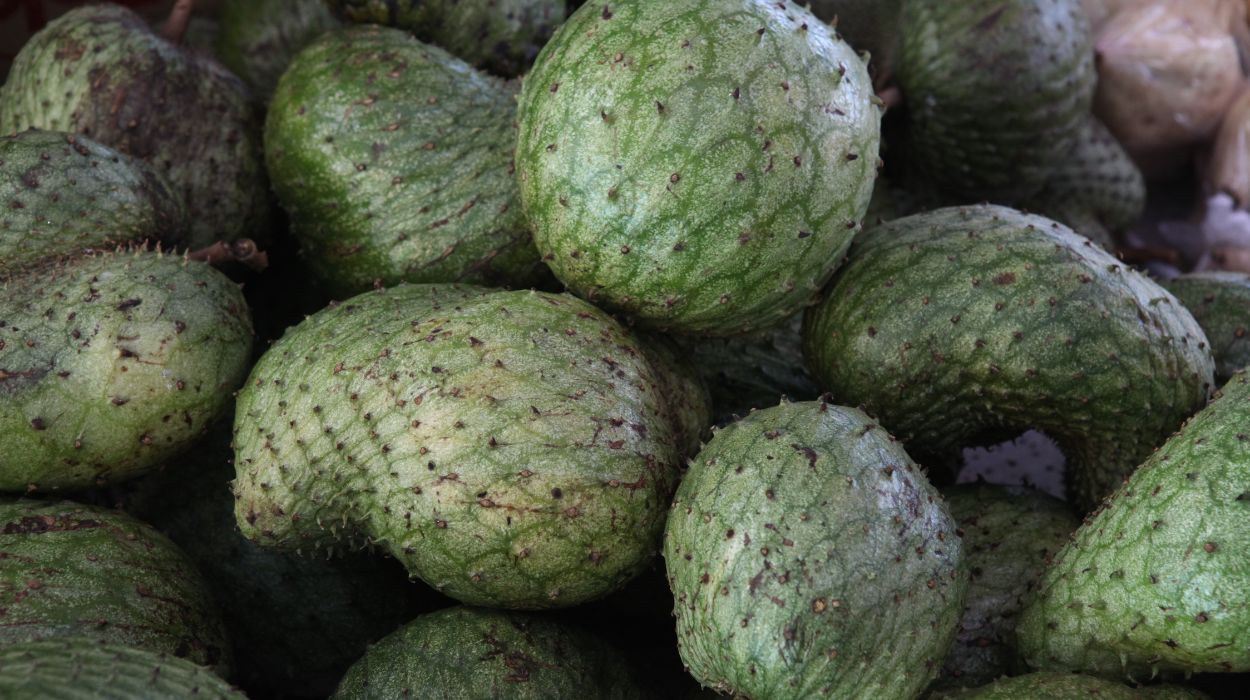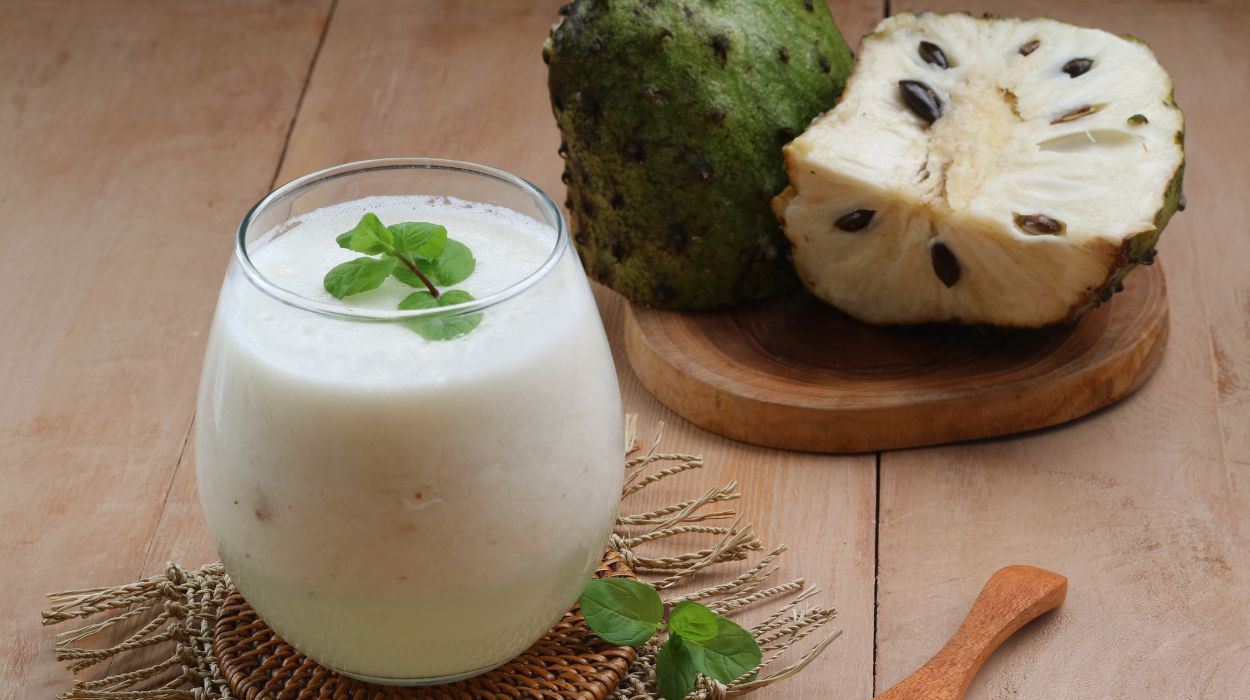Soursop benefits nutrition, and overall health, motivating the health-conscious to reevaluate the role of fresh fruits in weight loss. As we explore the remarkable benefits of soursop in 2024, we’ll see how it stacks up against some of the best green powders and other supplements on the market.
This guide delves into soursop benefits and side effects, its nutritional profile, how to incorporate it into your diet, and some common questions. Buckle up to learn how to improve your health and banish sugar cravings with this exotic fruit.
Health Benefits Of Soursop
- Antioxidant-Rich: Packed with compounds that combat oxidative stress.
- May Kill Cancer Cells: Exhibits potential in targeting and reducing cancer cells.
- Supports Heart Health: It may help regulate blood pressure and cholesterol levels.
- Boosts Immune System: High vitamin C content enhances immune defense.
- Improves Digestion: The fiber content promotes digestive health.
- Potential Anti-Diabetic Effects: Shows promise in blood sugar regulation.
- Relieves Pain And Inflammation: Contains elements that reduce inflammation and alleviate pain.
- Mental Health Benefits: Possesses compounds that can support mood stabilization and prevent anxiety and depression.
- Skin And Hair Health: Superior nutrition profile repairs cell damage and encourages hair growth.
Health Benefits Of Soursop

Given its rich antioxidant and nutrient content, fresh soursop competes with green powder and other popular health supplements in its ability to bolster overall wellness. Here’s an exploration of the most significant phytochemical and pharmacological properties of soursop:
Antioxidant Rich
Soursop is a rich source of antioxidants,[1] including vitamin C, quercetin, and several other compounds that help neutralize harmful free radicals. Ongoing exposure to these radicals can lead to various health issues, including heart disease and breast cancer.
Can Kill Cancer Cells
Soursop has been the subject of numerous studies[2] for its potential anticancer properties. Compounds in soursop, particularly acetogenins, have shown promising results in animal and in vitro studies in targeting and killing breast cancer cells without harming healthy cells. However, its effect on humans needs further research.
Studies have demonstrated that the ethanol extract from leaves of the soursop plant effectively targets[3] the breast cancer cell line. This in vitro anticancer potential suggests a possibility for future cancer treatments that are less harmful than conventional therapies for human cancer cells.
Supports Heart Health
The potassium and vitamin C content in soursop contribute significantly to heart health. Potassium helps regulate high blood pressure, whereas vitamin C is essential for strengthening the arteries’ walls and reducing cholesterol buildup. Therefore, Soursop plays a role in maintaining a healthy cardiovascular system and has long been used in traditional medicine.
Boosts Immune System
The soursop fruit contains compounds that stimulate the effects[4] of vaccines in immunocompromised women. Additionally, the stem extract of soursop demonstrated its antiviral activity in combating the herpes simplex virus type 1 (commonly associated with cold sores). Its close cousin, the sugar apple (Anonna squamosa), appears to significantly inhibit the activity of HIV.
Though the studies were in vitro, these findings highlight the potential for soursop and other Annona species to serve as natural antiviral agents.[1]
Improves Digestion
Rich in dietary fiber, soursop promotes digestive health. Additionally, fiber is essential for healthy digestion as it helps food move through the digestive tract more efficiently, preventing common digestive issues and contributing to overall gut health.
Potential Anti-Diabetic Effects
Soursop leaves contain flavonoids like quercetin, which reduce blood sugar levels by inhibiting carbohydrate absorption and enhancing insulin production and function. Studies on diabetic rats demonstrated that soursop leaf extract significantly reduced blood glucose[5] levels, highlighting the fruit’s potential as a natural treatment for diabetes.
Relieves Pain And Inflammation
Soursop extract has been used in traditional medicine for its ability to relieve pain and reduce swelling.[6] The anti-inflammatory properties of the flavonoids and other compounds in soursop extracts can prevent the pain and swelling associated with inflammation.
Mental Health Benefits
The magnesium content in soursop plays a crucial role in reducing stress and anxiety[7] and in producing serotonin,[8] a mood-enhancing chemical Magnesium helps regulate neurotransmitters, which send messages throughout the brain and body. It aids, thereby promoting a sense of calm and well-being.
Skin And Hair Health
Vitamins, minerals, and antioxidants in soursop contribute to healthy,[9] rejuvenated skin[9] and hair. These nutrients help repair damage at a cellular level, promote collagen production for skin elasticity, and nourish hair follicles for strong, vibrant hair.
Furthermore, animal studies have revealed that soursop can protect against[10] ethanol-induced gastric injury by releasing significant antioxidants and nitric oxide.
What Is A Soursop?
Soursop, known scientifically as Annona muricata,[6] is a tropical fruit that thrives in the Caribbean, Central America, and parts of South America. It’s a member of the Annonaceae family and is often referred to by various names such as graviola, guanabana, or Brazilian paw paw.
The tropical fruit has a spiky green exterior and soft, creamy white flesh speckled with black seeds. Its flavor is a unique blend of sweet and tart, reminiscent of strawberry and pineapple with hints of citrus. The texture of the fruit is said to have elements of banana, coconut, and custard.
Traditionally, every part of the soursop tree–including its fruit, seeds, leaves, and roots-is used for culinary and medicinal purposes.[1]
Nutritional Value Of Soursop
The dense and diverse nutrient profile of soursop mirrors the concentrated benefits found in high-quality fruit and vegetable supplements.
- Vitamin C: an essential antioxidant for immune function and skin health.
- B Vitamins: contains B vitamins like thiamine, riboflavin, and niacin, which are vital for converting food into energy and maintaining healthy cells.
- Potassium: crucial for maintaining healthy blood pressure and proper muscle and nerve function.
- Magnesium: supports over 300 biochemical reactions in the body, including muscle and nerve function, blood glucose levels, and protein synthesis.
- Dietary Fiber: a good source of dietary fiber, promoting digestive health and aiding in weight management and blood sugar regulation.
- Antioxidants: contains antioxidants like quercetin, tannins, and phytosterols, which can reduce inflammation.
For a typical one-cup serving, soursop offers the following nutritional values:[11]
- Calories: Approximately 150.
- Carbohydrates: 38 grams.
- Dietary Fiber: 7 grams.
- Sugars: 30 grams.
- Protein: 2 grams.
- Vitamin C: 46 mg or about 77% of the Daily Value (DV).
- Potassium: 626 mg or about 20% of the DV.
- Magnesium: 47 mg or about 8% of the DV.
This diverse nutrient profile establishes soursop as a valuable addition to a balanced diet, especially for individuals looking for nutrient-dense, low-calorie options.
Possible Side Effects
While soursop has many amazing benefits, it’s important to know its side effects and interactions.[6] Overconsumption can lead to neurological effects[12] similar to Parkinson’s disease, and it may interact with certain medications. Pregnant and breastfeeding women should avoid consuming soursop due to potential complications.
How To Eat Soursop

Soursop is a fruit that can be enjoyed in numerous ways.
- Fresh Out of Hand: Cut the fruit in half, scoop out the pulp, and eat it directly, avoiding the hard seeds.
- Soursop Smoothies: Blend the pulp with a choice of liquid and other fruits for a nutritious smoothie.
- Soursop Juice: Strain the pulp to remove seeds and fibers, then mix the juice with water or other fruit juices.
- Soursop Tea: Boil soursop leaves in water to create a tea that can be enjoyed hot or cold.
- Soursop Ice Cream or Sorbet: Make ice cream by blending the pulp with cream and sweetener, or freeze the strained juice for sorbet.
- Soursop Desserts: Incorporate the pulp into cakes, pies, or mousses for a tropical dessert.
- Soursop Salad: Combine soursop pieces with other tropical fruits and season with lime juice and chili powder.
- Soursop Salsa: Mix chopped soursop with onions, tomatoes, cilantro, and lime juice for a unique salsa.
- Soursop Cocktails: Muddle soursop pulp with spirits and mixers for a refreshing beverage. It pairs well with rum, making it perfect for tropical cocktails.
Each preparation method offers a unique way to enjoy soursop’s delightful flavors and health benefits. Remember, always discard the soursop seeds as they are not edible.
Conclusion
Soursop health benefits are diverse and significant. As research continues, the full scope of the soursop fruit benefits may become even more apparent. In the meantime, enjoying soursop is a great way to add variety to your diet while still eating healthy. It uniquely combines taste and health, whether consumed as a fruit, juice, or tea.
Frequently Asked Questions
Soursop boosts immunity, fights inflammation, supports heart health, aids in digestion, and promotes skin and hair health.
Yes, eating soursop every day can be beneficial due to its high nutrient and antioxidant content. However, moderation is key to avoiding any adverse effects.
Yes, soursop’s antioxidant properties can aid liver health by reducing oxidative stress and enhancing liver function.
Boiled soursop leaves benefits range from pain relief to reduction of inflammation. You can make a therapeutic tea that helps relieve pain, reduce inflammation, and potentially enhance immune function.
Overconsumption of soursop can lead to neurological issues, and it can interact with some medications. Pregnant and breastfeeding women should avoid it due to potential risks.
 Evidence Based
Evidence Based
